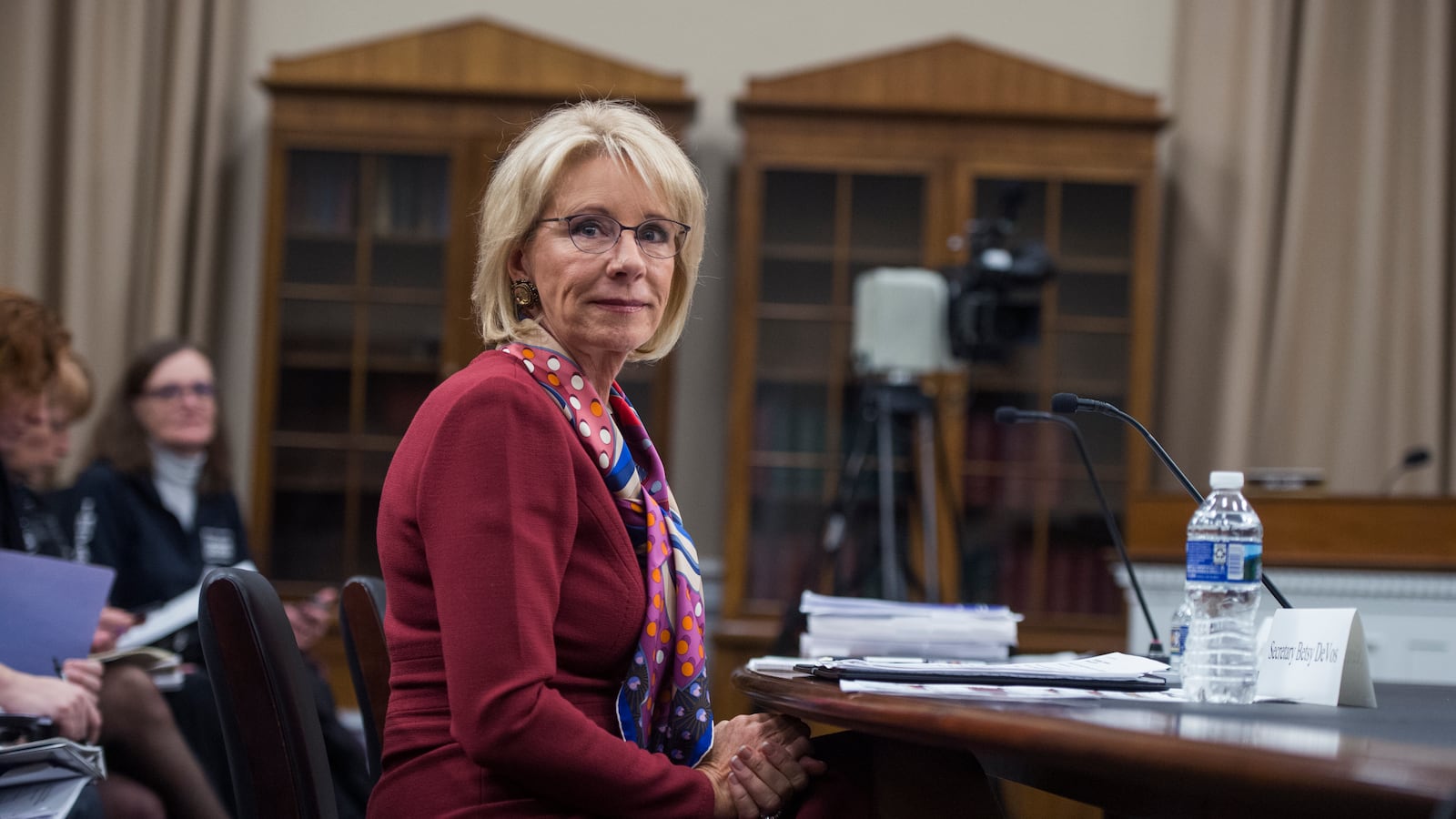U.S. Education Secretary Betsy DeVos fielded some hostile questions on school safety and racial discrimination as she defended the Trump administration’s budget proposal in a House committee hearing on Tuesday.
The tone for the hearing was set early by ranking Democrat Rep. Rosa DeLauro, who called aspects DeVos’s prepared remarks “misleading and cynical” before the secretary had spoken. Even the Republican subcommittee chair, Rep. Tom Cole, expressed some skepticism, saying he was “concerned about the administration continuing to request cuts that Congress has rejected.”
During nearly two hours of questioning, DeVos stuck to familiar talking points and largely side-stepped the tougher queries from Democrats, even as many interrupted her.
For instance, when Rep. Barbara Lee, a Democrat from California, complained about proposed spending cuts and asked, “Isn’t it your job to ensure that schools aren’t executing harsher punishments for the same behavior because [students] are black or brown?” DeVos responded by saying that students of color would benefit from expanded school choice programs.
Lee responded: “You still haven’t talked about the issue in public schools as it relates to black and brown students and the high disparity rates as it relates to suspensions and expulsions. Is race a factor? Do you believe that or not?” (Recent research in Louisiana found that black students receive longer suspensions than white students involved in the same fights, though the difference was very small.)
Again, DeVos did not reply directly.
“There is no place for discrimination and there is no tolerance for discrimination, and we will continue to uphold that,” she said. “I’m very proud of the record of the Office of Civil Rights in continuing to address issues that arise to that level.”
Lee responded that the administration has proposed cuts to that office; DeVos said the reduction was modest — less than 1 percent — and that “they are able to do more with less.”
The specific policy decision that DeVos faces is the future of a directive issued in 2014 by the Obama administration designed to push school districts to reduce racial disparities in suspensions and expulsions. Conservatives and some teachers have pushed DeVos to rescind this guidance, while civil rights groups have said it is crucial for ensuring black and Hispanic students are not discriminated against.
That was a focus of another hearing in the House on Tuesday precipitated by the shooting last month at Marjory Stoneman Douglas High School in Parkland, Florida.
Rep. Jim Sensenbrenner, a Wisconsin Republican, falsely claimed in his opening statement that Broward County Public Schools rewrote its discipline policy based on the federal guidance — an idea that has percolated through conservative media for weeks and been promoted by other lawmakers, including Florida Sen. Marco Rubio and Utah Sen. Mike Lee. In fact, the Broward County rules were put into place in 2013, before the Obama administration guidance was issued.
The Manhattan Institute’s Max Eden, a leading critic of Obama administration’s guidance, acknowledged in his own testimony that the Broward policy predated these rules. But he suggested that policies like Broward’s and the Obama administration’s guidance have made schools less safe.
“Faced with pressure to get the numbers down, the easiest path is to simply not address, or to not record, troubling, even violent, behavior,” he said.
Kristen Harper, a director with research group Child Trends and a former Obama administration official, disagreed. “To put it simply, neither the purpose nor the letter of the federal school discipline guidance restrict the authority of school personnel to remove a child who is threatening student safety,” she said.
There is little, if any, specific evidence linking Broward County’s policies to how Stoneman Douglas shooter Nicholas Cruz was dealt with. There’s also limited evidence about whether reducing suspensions makes schools less safe.
Eden pointed to a study in Philadelphia showing that the city’s ban on suspensions coincided with a drop in test scores and attendance in some schools. But those results are difficult to interpret because the prohibition was not fully implemented in many schools. He also cited surveys of teachers expressing concerns about safety in the classroom including in Oklahoma City; Fresno, California; and Buffalo, New York.
On the other hand, a recent study found that after Chicago modestly reduced suspensions for the most severe behaviors, student test scores and attendance jumped without any decline in how safe students felt.
DeVos is now set to consider the repeal of those policies on the Trump administration’s school safety committee, which she will chair.
On Tuesday, DeVos said the committee’s first meeting would take place “within the next few weeks.” Its members will be four Cabinet secretaries: DeVos herself, Attorney General Jeff Sessions, Secretary of Health and Human Services Alex Azar, and Secretary of Homeland Security Kirstjen Nielsen.
Correction: An earlier version of this story said that Rep. Barbara Lee was from Texas; in fact, she represents a California congressional district.


